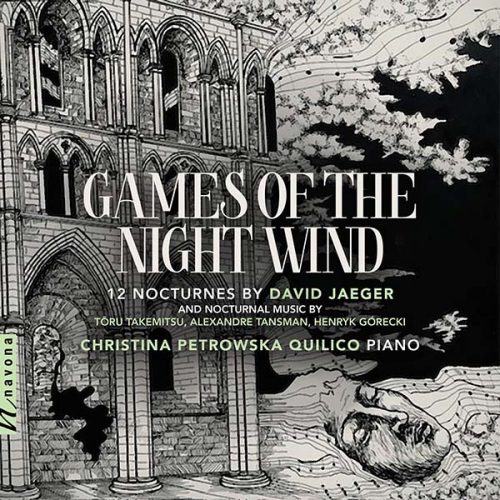
Games Of The Night Wind
David Jaeger composer
Tōru Takemitsu composer
Alexandre Tansman composer
Henryk Górecki composer
Christina Petrowska Quilico piano
Releases: May 10, 2024
Described by the Oskar Morawetz Award jurors as a “legend” of Canadian musicians, Christina Petrowska Quilico joins lauded composer and champion of new music David Jaeger on GAMES OF THE NIGHT WIND, a dreamy musical landscape premiering 12 of Jaeger’s original nocturnes in addition to seven 20th century solo piano works.
Each nocturne invokes a different spirit of the night: deception, memory, redemption, realization, and many more, each brought to fruition by Petrowska Quilico’s evocative musicality. Sharp staccato and an increasingly startled momentum drives the image of an encounter with the shadows in Nocturne 11, The Alarm Bell, a weighty contrast to the deep rubato and heaving nostalgia in Nocturne 1, In Memory Of — yet both hail from the same thematic darkness that expands across the entirety of the album. These sensations are ever present in Tōru Takemitsu’s starry Les yeux clos, Alexandre Tansman’s complex and lyrical nocturnes, and two works by Górecki, whose Lullaby sings GAMES OF THE NIGHT WIND off to sleep.
GAMES OF THE NIGHT WIND plays to the unfettered wildness of the night, a force of nature encapsulated in every aspect of Petrowska Quilico and Jaeger’s musical and poetic collaboration, an elegant exploration for the night owl in us all.
Credits
Recorded December 18, 2023 at Imagine Sound Studio in Toronto, Ontario, Canada
Recording Session Producer David Jaeger
Recording Session Engineer Dennis Patterson
Editing & Mastering David Jaeger
Cover art by Christina Petrowska Quilico
Publicist, pianist’s bio, and general editing of program notes by Linda Litwack
Executive Producer Bob Lord
VP of A&R Brandon MacNeil
VP of Production Jan Košulič
Audio Director Lucas Paquette
VP, Design & Marketing Brett Picknell
Art Director Ryan Harrison
Design Edward A. Fleming
Publicity Chelsea Kornago
Tracks
1.
Les Yeux Clos
07:26
2.
Nocturne No. 1 - In Memory Of
02:52
3.
Nocturne No. 2 - A Blessing
02:34
4.
Nocturne No. 3 - Tumult
02:29
5.
Nocturne No. 4 - The Murmur
04:48
6.
Nocturne No. 1 - Moderato
2:06
7.
Nocturne No. 2 - Moderato
01:53
8.
Nocturne No. 3 - Moderato
02:10
9.
Nocturne No. 4 - Lento
01:26
10.
Nocturne No. 5 - The Holes of Night
02:14
11.
Nocturne No. 6 - Forget the Day
03:21
12.
Nocturne No. 7 - The Red Deer
01:51
13.
Nocturne No. 8 - The House and You
01:57
14.
Intermezzo
02:36
15.
Nocturne No. 9 - Lament for the People of Ukraine
02:37
16.
Nocturne No. 10 - Games of the Night Wind
04:09
17.
Nocturne No. 11 - The Alarm Bell
01:54
18.
Nocturne No. 12 - Conjure You
06:17
19.
Lullaby (Kolysanka)
03:11
Notes
The seeds of my 12 Nocturnes for solo piano began in 2019 when I met the Scottish poet David Cameron in person for the first time. I had set some of his beautiful, innately musical poems as songs, but when we met, we began to discuss the relationship between music and the spoken word. We decided to try collaborating on a series of pieces in which I would compose piano accompaniments to his recited poetry. Cameron selected several of his poems — which he described as dark — and the completed collaboration was then titled In a Darker Vein.
At some point during the work on the latter set of pieces, I suddenly had the notion that the piano parts I was writing to accompany Cameron’s words could easily evolve into separate pieces for piano solo by replacing the spoken word component with additional music. Given that I was working with poetry that was decidedly dark, I had the idea to make some of them into Nocturnes — music for a dark time. As I continued to write nocturnes this way, I began to show my scores to Christina Petrowska Quilico, who immediately responded to them with surprising enthusiasm. I found poetry from other authors also fit the theme and mood of the pieces. Petrowska Quilico herself, who has written poetry throughout her career, responded by creating nocturnal poems that fit the project perfectly. And I also chose poems by two friends, the late Seán Haldane and Bruce Whiteman.
— David Jaeger
These are the twelve pieces and their descriptions:
In Memory Of (Poetry by David Cameron) dwells on the memory of those dear to us that we have lost.
A Blessing (Poetry by David Cameron) addresses our connection with the spiritual world.
Tumult (Poetry by Bruce Whiteman) contrasts the noise made by crows with human expressions of love and endearment.
The Murmur (Poetry by Seán Haldane) is an expression of a cry from the deepest places in the heart.
The Holes of Night (Poetry by Christina Petrowska Quilico) describes the unique qualities of the night and how they affect our psyche.
Forget the Day (Poetry by Christina Petrowska Quilico) focuses on the allure of the realm of the night.
The Red Deer (Poetry by David Cameron) describes an epiphany provoked by an encounter in nature.
The House and You (Poetry by David Cameron) offers redemption from the dark, only to be broken by a deception.
Lament for the People of Ukraine is a response to the invasion of Ukraine, based on a melody composed much earlier, inspired by words of Bruce Whiteman.
Games of the Night Wind (Poetry by Christina Petrowska Quilico) depicts the wild, uncontrollable atmosphere of the nocturnal realm.
The Alarm Bell (Poetry by David Cameron) describes a febrile encounter with the shadow-self.
Conjure You (Poetry by David Cameron) is an evocation of the artist’s Muse.
Artist Information

David Jaeger
David Jaeger is a music producer, composer, and broadcaster. Jaeger’s compositions range from chamber music to vocal and choral works and opera, as well as orchestral and electronic music. His works for the piano form a large portion of his canon, most of it added since his retirement from CBC in 2013. Since that date, Jaeger has concentrated increasingly on compositions for solo instruments and voices, often based on literary texts. His Nocturnes, written between 2020 and 2023, are all based on poetry he compiled from several authors who he has collaborated with: David Cameron, Seán Haldane, Bruce Whiteman, and his pianist collaborator, Christina Petrowska Quilico.
More Info
David Jaeger is a music producer, composer, and broadcaster. He joined the CBC in 1973 as a radio music producer for various series including Music of Today, which included 10 broadcasts he produced in 1974 with Glenn Gould, in celebration of the centennial of composer Arnold Schoenberg. Jaeger and Gould remained friends and collaborators until Gould’s death in 1982. Jaeger created “Two New Hours,” an important contemporary music series in Canada which was heard on the national CBC Radio Two network from 1978 to 2007. During that time he commissioned over 300 original musical works for presentation on air, and broadcast more that 3,000 world premiere performances.
He supported the creation of important new music festivals, such as the Winnipeg Symphony Orchestra’s long running new music festival, broadcasting hundreds of live concerts.
From 1974 to 2002 he served as the CBC Radio coordinator of the CBC/Radio-Canada National Radio Competition for Young Composers, encouraging the establishment of a new wave of Canadian composers.
In the early 1970s Jaeger established a digital sound synthesis facility at the University of Toronto, one of the first in Canada. In 1971 he co-founded the Canadian Electronic Ensemble (CEE), the longest running live electronic ensemble in the world. With the CEE he commissioned dozens of new works for live electronic performance. In 2002 Jaeger was elected President of the International Rostrum of Composers, and was the only non-European ever to be named to this post. He served as President for six years.
Jaeger’s compositions range from chamber music to vocal and choral works and opera, as well as orchestral and electronic music. His works for the piano form a large portion of his canon, most of it added since his retirement from CBC in 2013. Since that date, Jaeger has concentrated increasingly on compositions for solo instruments and voices, often based on literary texts. His Nocturnes, written between 2020 and 2023, are all based on poetry he compiled from several authors who he has collaborated with: David Cameron, Seán Haldane, Bruce Whiteman, and his pianist collaborator, Christina Petrowska Quilico. Jaeger won numerous broadcasting awards, including the CBC President’s Award in 2009. He was named a member of the Order of Canada in 2018.

Christina Petrowska Quilico
The Canadian Encyclopedia calls Christina Petrowska Quilico, C.M., O.Ont, FRSC, “one of Canada’s most celebrated pianists. Equally adept at Classical, Romantic and Contemporary repertoires… she is also a noted champion of Canadian composers.” She was appointed to the Order of Canada in 2020 “for her celebrated career as a classical and contemporary pianist, and for championing Canadian music” and to the Order of Ontario in 2022 “for opening the ears of music lovers through her performances and recordings, her teaching at York University and her establishment of The Christina and Louis Quilico Award at the Ontario Arts Foundation and Canadian Opera Company.”
More Info
She was also inducted in 2021 into the Royal Society of Canada, “the country’s highest honour an individual can achieve in the Arts, Social Sciences and Sciences.” In September 2023, the Ontario Arts Council named her winner of its Oskar Morawetz Award for Excellence in Music Performance for having “reached a degree of international attention through appearances in other countries, and/or through broadcast and recordings.”
Previous distinctions include the Friends of Canadian Music Award from the Canadian Music Centre and Canadian League of Composers, and being selected as one of the CMC’s Ambassadors of Canadian Music. The CBC chose her as one of “20 Can’t-Miss Classical Pianists” and one of “Canada’s 25 best classical pianists,” and inducted her into its “In Concert Hall of Fame” celebrating the greatest Canadian classical musicians of all time, past and present. At York University, where she taught for 35 years, she is a Professor Emerita, Senior Scholar, and for three consecutive years was a recipient of the university’s highly prized Research Awards, and one of only two in 2023 given Distinguished Honors as “outstanding contributors to their fields and beyond.”
Among Quilico’s output of more than 50 CDs are 19 concertos, and solo and chamber works by contemporary and international composers, many of them women — most notably Canada’s Ann Southam, whose music she has recorded on five Centrediscs albums, comprising eight discs. Four of her CDs have earned JUNO Awards nominations, three of them for concerto CDs, and one for Southam’s cycle Glass Houses Revisited, which is Centrediscs’ all-time best seller and was named one of “30 best Canadian classical recordings ever” by CBC Music.
The pandemic years have seen other new accomplishments and accolades given to this musician described as a “piano wizard” (Take Effect) and “the towering Canadian piano virtuoso” (The WholeNote), and praised for her “commanding pianism” (American Record Guide), “intelligent programme” (Gramophone), and her “ability to leave a permanent impression on the listener’s soul” (Sonograma Magazine, Barcelona) for her three solo albums on Navona Records. VINTAGE AMERICANA made a number of 2021’s best-of lists in Canada and abroad. She was also featured on Parisa Sabet’s A Cup of Sins (Redshift Records) and Alice Ping Yee Ho’s solo piano album Blaze — the latter appearing in spring 2023 on Centrediscs, as did Shadow & Light, an album of three double concertos by Ho and fellow Canadians Larysa Kuzmenko and Christos Hatzis, recorded with violinist Marc Djokic and Sinfonia Toronto conducted by Nurhan Arman. In March 2023 she gave the Toronto-area premiere of the Florence Price Piano Concerto, with the York Chamber Ensemble and conductor Michael Berec. On October 21, Quilico joined Maestro Kristian Alexander in the Piano Concerto and the Paganini Variations by Polish composer Witold Lutosławski, celebrating his 110th anniversary, in the Kindred Spirits Orchestra’s gala season opener. She will be recording More Rivers, a solo piano suite written for her by Frank Horvat and funded, along with further projects relating to music and the environment, by a grant from the Canada Council for the Arts.
After making her orchestral debut at 10, playing the Haydn D major concerto with Toronto’s Conservatory Orchestra, Quilico studied on scholarship at New York’s Juilliard School under the legendary Rosina Lhévinne. Co-winning a concerto prize at age 15 with pianist Murray Perahia, she was called “a promethean talent” by the New York Times. She continued to give solo and chamber recitals at many of the city’s venerated recital halls including Carnegie, Alice Tully, and Merkin halls, garnering superlatives from the New York Times critics, who deemed her “an extraordinary talent with phenomenal ability…dazzling virtuosity,” playing Olivier Messiaen “to perfection.”
Studies followed at the Sorbonne in Paris, and with Karlheinz Stockhausen and György Ligeti in Darmstadt and Berlin. Pierre Boulez coached her in two of his sonatas, which are featured on her 2021 Navona Records album SOUND VISIONARIES (“This primer of twentieth century French piano music gets better with each repeated listen.” – Pianomania, Singapore). She has traveled widely, performing more than 53 concertos — from Bach and Haydn to present-day composers — with orchestras across Canada and in the United States, and in Greece and Taipei. Besides those countries, recitals have taken her to England, France, Germany, Eastern Europe, and the Middle East. Her ancestry is mostly Polish, but also a mix of Slovak, Ukrainian, German, Welsh, Danish, and Swedish.

Tōru Takemitsu
Tōru Takemitsu (1930-1996) was a Japanese composer and writer on aesthetics and music theory. Largely self-taught, Takemitsu is famed for crystalline compositions of his own Japanese traditions with the western modernism he loved so much and for fusing opposites together such as sound with silence and tradition with innovation. “Listening to my music can be compared with walking through a garden and experiencing the changes in light, pattern and texture.”

Alexandre Tansman
Alexandre Tansman (1897-1986) was a Polish composer who followed several artistic principles: logic in form, simplicity and fluidity in style, and the use of rich lyrical elements without falling prey to excessive pathos or empty sentimentality. In a manner reminiscent of Chopin, Tansman combines the lyricism of Polish folk songs with complex harmonic structures.

Henryk Górecki
Henryk Górecki (1933-2010) was a Polish composer who composed in several distinct phases in his compositions, sharing similarities with Lutosławski, Serocki, and Penderecki. His first notable phase was that of Modernism, clearly influenced by Szymanowski, Webern, and Bartók. Górecki’s compositional techniques in the 1960s were often based on geometry, including axes, figures, one and two-dimensional patterns, and especially symmetry. During the mid-1960s and early 1970s, Górecki progressively moved away from his early career as radical modernist, and began to compose in a more traditional, romantic mode of expression.
View Texts
#1 - IN MEMORY OF (Poetry by David Cameron)
‘You’ll not remember him,’ they say,
As if pleased by the certainty.
Can’t they see
It’s you who’ll not remember me?
#2 - A BLESSING (Poetry by David Cameron)
I call a blessing
Down on your head.
A shadow’s moving
In the oyster bed.
I hear a whisper
In the loudest room.
I see an angel
Perched on my tomb.
Angel oh angel,
Put down your pen.
Did I love enough?
Will I see her again?
#3 - TUMULT (Poetry by Bruce Whiteman)
The crows have congregated in the street
and caw at every passing living thing.
They do not love, despite their
universal scorn and seeming lack of
self-restraint. It isn’t fair
to ask intolerant birds and other
lolloping creatures to act like us.
They don’t have faith or long for
something more than weather –
string quartets and unsought kisses
and one more book, just one more book
from Marianne Moore. “All this fiddle,”
indeed. How raucous they are, for God’s
sake, overpowering thought and focusing
the lovely moment, rough music while it lasts.
#4 - THE MURMUR (Poetry by Sean Haldane)
The Murmur has become a shout:
Let me out, out, out!
The beating has become a din
Of hellish klaxons under skin,
The heart in its little room
Bursting in a bloody tomb
Of macerated bits of pain –
Not again, again, again.
I did this to you my chest
Once one to one on your breast
Removed a world away – gone,
You left there, heart cracking bone.
The Murmur has become a shout:
Let me out, out, out
To you my love who hurt me so
Again you’ve let me go.
I let you go and like a stone
I dropped over the horizon
Away from the sunset-bloodied West
From you I said I loved the best.
My Murmur has become a shout:
Let me out, out, out!
My flown-back bird has found its nest,
I hear your heart through your breast,
My mutter has become a moan,
Let me home, home, home.
…..
#5 - The Holes of Night - Apparitions (poetry by Christina Petrowska Quilico)
The holes of night watch me
From between the fingers of silence.
A word here, a sound there,
Speaking in holes of sounds,
Hearing the Silence of the Night.
#6 - Forget the Day - from Night Poems (poetry by Christina Petrowska Quilico)
You have woven a web of sounds to
titillate the empty air
With an earful of silent music.
I stretch my mood,
Sculpting a feeling from evolving
sounds.
A mood-sound unfolds its music
Here and there in space into the
unknown.
Forget the day,
There is nothing real outside the
periphery of dreams.
Nothing at all leading into the
metaphoric corridors
That doesn’t thread back to the samedoor,
Each successive turn, another snapshot
of an inner image
Still buried in the recesses
Of a subconscious labyrinth and form.
In the world of shadows
My reflection casts a hermetic
solitude, tempting me
With its mathematics to penetrate the
invisible,
Spinning a cataleptic map of routes
Through sounds and space.
Hallucinations make their appearance
Only to disappear when viewed directly
And the night remains in musical sounds
Behind the lids.
Outlines of breathing dreams
Slide eerily into the dawn of gesture,
Almost there, in gentle pressure
Among the heliocentric sums.
……
#7 - The Red Deer (poetry by David Cameron)
The red deer took one look and sized me up.
I played for time – backed off, kept my head low.
Wind through the whins the narrowness of fate.
Time can’t be played for on the moors.
The fate the red deer left me’s not to know –
Was she the truth, the arrow, or the gate?
#8 - The House and You (poetry by David Cameron)
The house and you were beautiful.
The scene was set so perfectly
For my repentance:
You took me in your arms.
The vista of forgiveness
Narrowed further.
You learned from my distress
You had no time for weakness.
Except the you was not the real you,
The me not quite myself.
And the house?
A leak had flooded
The foundations. Our neighbour said,
‘The beauty of it is
The leak’s a spring.
Get that hooked up, and you’ll be laughing.’
#9 - Nocturne - Lament for the People of Ukraine
This piece is not actually a setting of any poetry. Some years ago, the poet Bruce Whiteman
game me a poem called A Warning. The melody I wrote for this setting is pretty close to that of
the Lament. However, Whiteman’s poem is a love poem, and the Lament is not.
#10 - The Games of the Night Wind (excerpted from a poem by Christina Petrowska Quilico)
Let me hold this music,
Touching the sounds as they run their
fingers through my hair.
In the atmosphere
I hear a work so open,
We can hear through it to everything
around it.
The forms unfold themselves from the
score,
Playing with their games of the night
wind.
Sound, a skin-scream in my fingers.
Touch, a time-wave,
Born haunting a shadow of fever
In my nightmares.
Each dream we throw away, thinking it
will return,
Already belongs to someone else.
#11 - The Alarm Bell (poetry by David Cameron)
From under green netting
That seemed filched from a cage,
He looked at me so steadily;
In appearance, a junkie or dead
sailor. Itinerant, almost feral,
He and his whole family
Were bristling in the car like cornered cats.
‘Where have you been hiding, then?’ I
asked, fake-nonchalantly,
All the time his eyes held me
Dying to get away.
The next day woke to rage
That coloured the day greenly
And I saw him there
And knew he was myself,
The cornered family my family.
That’s when he rang the alarm bell,
Yelled: ‘You’re back on the junk.
You’ve drowned in the sea again.’
#12 - Conjure You (poetry by David Cameron)
Is there a letter that could conjure you? Or
what metamorphosis must I go through? In
whose company would I find you?
Tie up the black parcels with string And go
to their funeral-wedding.
Strip your body, your world, of meaning.
Nothing ever amazes
There, where heaven’s explained to us.
It’s you, your edge, I’ve wanted
always.
….






